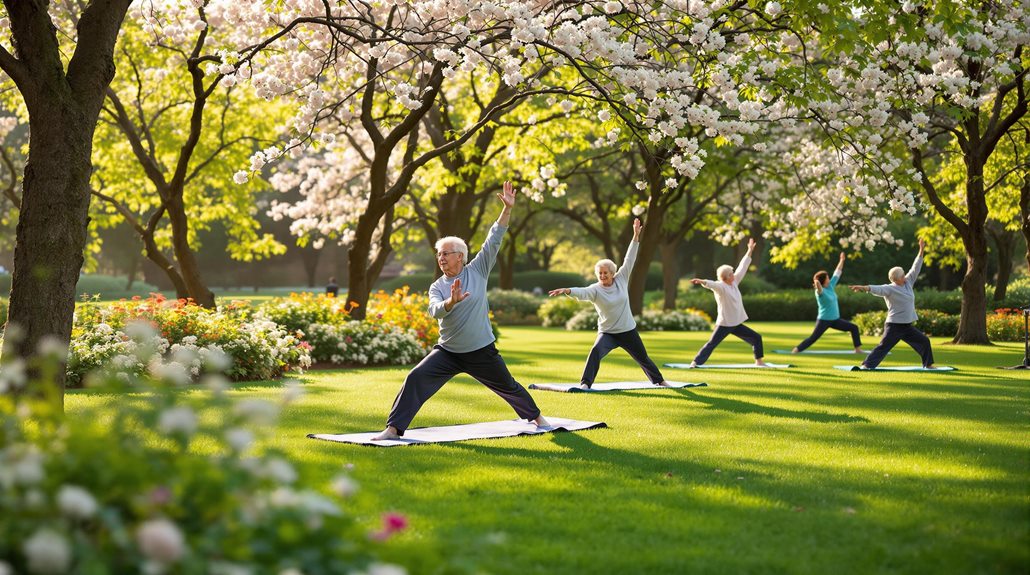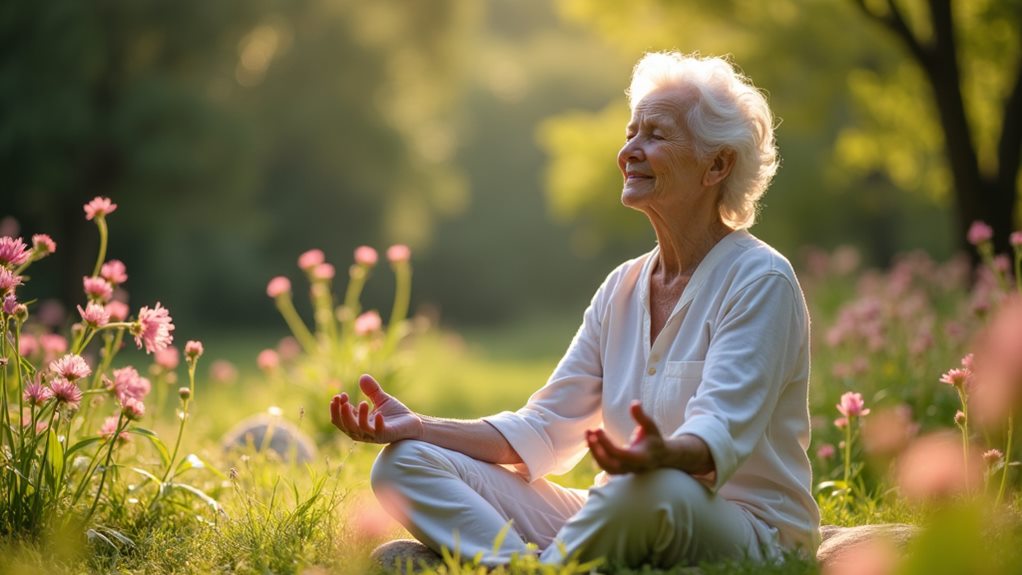
Feeling stressed isn’t just for the young, and seniors have fantastic ways to shake it off. Put on your walking shoes, dive into tai chi, and let your worries melt as endorphins boost your mood. Don’t overlook the soothing power of mindful breathing—your heart and sleep patterns will thank you. Brush off the dust on those old art supplies and express yourself creatively to lower cortisol levels. Still feeling tense? Build a social circle with group classes or volunteer work to enrich your days. There’s more to these techniques, and they might just transform your golden years into stress-free bliss.
Understanding Senior Stress
When it comes to understanding senior stress, it’s crucial to recognize the unique pressures older adults face. You might think that retirement means endless relaxation, but the truth is, many seniors grapple with significant stressors. Healthcare expenses loom large, sparking anxiety about finances. Family dynamics can shift like quicksand, and the loss of loved ones creates emotional upheavals like earthquakes in the soul. Additionally, functional GI disorders, such as irritable bowel syndrome, can develop from sustained stress responses, further exacerbating the stress levels. Aging brings unfamiliar challenges that can cause everything from tension headaches to back pain and indigestion. Chronic stress is no joke—it’s a notorious culprit behind nasty health issues like hypertension, heart disease, and cognitive decline. Imagine stress as that nagging neighbor who refuses to leave; it deteriorates your quality of life bit by bit.
Effective stress management is your secret weapon. Spotting the signs of stress in older adults is crucial. You’re not just saving the day; you’re boosting their overall well-being. So next time Grandma lets out a sigh of exhaustion or Uncle Joe starts forgetting things, think stress. Addressing these issues head-on keeps their lives vibrant and full, making aging something to embrace, not fear.
Benefits of Physical Activity
Forget the clichéd image of passive golden years—staying cozy under blankets with a cup of tea. It’s time to kick stress to the curb with regular physical activity! Sure, lounging sounds tempting, but engaging in some sweat-inducing fun offers outstanding stress relief. Regular physical activity isn’t just good for your waistline; it’s a fantastic ally in the battle against stress hormones like adrenaline and cortisol. Alongside its stress-relieving properties, exercise enhances self-confidence and mood, filling your days with positive energy. Instead, embrace those mood-boosting endorphins!
Dive into enjoyable fun like walking, swimming, or tai chi, and watch as your mental health and heart disease risk improve. Say goodbye to chronic pain and hello to a better quality of life. Whether you’re aiming for relaxation techniques or enhanced mental well-being, these activities can significantly reduce stress and anxiety symptoms.
But wait, there’s more! Regular physical activity also keeps your mind sharp, fending off cognitive decline and memory loss. Balance and flexibility exercises, like yoga and chair workouts, help you stay independent and upright—no falls here!
Practicing Mindfulness Techniques

Amid the hustle and bustle of life’s golden years, adopting mindfulness techniques can be your stress-busting oasis. Your mind and body deserve a break from stress and anxiety, and mindfulness is the key. Start by focusing on the present moment with meditation and focused breathing. These techniques aren’t just trendy; they’re brain-boosting superpowers that improve attention and emotional regulation. Similar to Chakra Yoga, which enhances emotional stability and mental clarity, mindfulness encourages a deep connection to oneself. Progressive muscle relaxation will have you feeling like a relaxed noodle—no stress can resist the power of deliberately tensing and relaxing each muscle group. Guided imagery also dives deep into relaxation. Picture your favorite serene place, let that image wash over you, and watch your worries fade away. It’s like a mini-vacation for your brain!
Activities like yoga and tai chi aren’t only great for physical health—they offer a profound sense of calm and clarity, aging loved ones included. By consistently engaging in these mindfulness exercises, you’ll likely notice an improved mood and better cognitive function. Don’t let stress be the boss—make mindfulness your go-to strategy. Your future self will thank you. So, breathe in, breathe out, and reclaim your peace.
Exploring Creative Outlets
Diving into creative outlets isn’t just an artful escape; it’s a powerful weapon against stress for seniors. Embrace your inner artist through painting, drawing, or crafting—your ticket to emotional balance. Art therapy does wonders for reducing those pesky cortisol levels and significantly boosts your emotional well-being. You’ll find a creative outlet perfect for expressing bottled-up feelings while magically reducing stress. Plus, who wouldn’t want the satisfaction of creating their own masterpiece?
Grab a pen and start journaling to articulate your thoughts and feelings. This simple act is an emotional powerhouse, paving the way for processing emotions and lessening anxiety. With each word you jot down, you’re actively tackling health problems related to stress.
Not your cup of tea? How about some music therapy? Whether you’re channeling Beethoven on a piano or just listening to your favorite tunes, music can evoke positive emotions and promote relaxation. Let the melodies work their magic on your mood and stress levels.
Lastly, put on your chef’s hat and take a culinary journey. Cooking and baking are rewarding and spark creativity, offering a delicious recipe for reduced stress and isolation.
Building Social Connections

Connection is the secret ingredient to happiness and resilience in our golden years. You might not realize it, but social interaction can work wonders for your emotional health and stress levels. Feeling isolated? Engage in group activities like clubs or classes. Joining one can transform a dull day into a delightful experience while boosting your emotional resilience.
Have you thought about volunteering? It doesn’t just fill your time—it fills your heart. Helping others can enhance your self-esteem and introduce you to new friendships that enrich your mental well-being. Plus, community engagement creates a sense of belonging that’s downright essential for a happy life. Attend local events or support groups and watch loneliness take a backseat.
Let’s not forget the magic of maintaining friendships and family ties. These connections don’t appear with fairy dust—they require care. But the payoff? A vital support network that helps you tackle life’s challenges head-on. Enjoy organized social events or exercise classes—they’re perfect for boosting mental health and keeping stress levels in check.
Mindful Breathing Is Essential
Stress relief is essential for maintaining the overall well-being of seniors, and among the various techniques available, mindful breathing stands out as a particularly effective method. This practice not only activates the parasympathetic nervous system to induce relaxation but also provides numerous cascading benefits that address common challenges faced by seniors. By lowering heart rates and reducing stress levels, mindful breathing serves as a natural remedy for anxiety, while fostering emotional stability and resilience. The significance of incorporating such an approachable and therapeutic practice into daily routines cannot be overstated.
Mindful breathing empowers seniors with the tools to improve focus and mental clarity, making the management of stress more attainable and ensuring that cognitive functions remain sharp. As seniors engage in regular deep breathing exercises, they may find an increase in their ability to find peace and maintain a clear mind. This daily practice can also significantly enhance sleep quality, a welcome benefit for those battling insomnia. By calming both mind and body, seniors will likely experience more restful nights, which are instrumental in sustaining a healthy lifestyle.
Even beyond the physical and cognitive benefits, mindful breathing provides an avenue for emotional connection and presence. By centering individuals in the present moment, it alleviates feelings of loneliness and isolation, fostering a sense of belonging and inner tranquility. As seniors embrace the art of mindful breathing, they rediscover a mindful presence, allowing them to face each new day with confidence and peace. These advantages combine to underscore the importance of mindful breathing as an essential strategy for stress relief that enhances the quality of life in the golden years.














